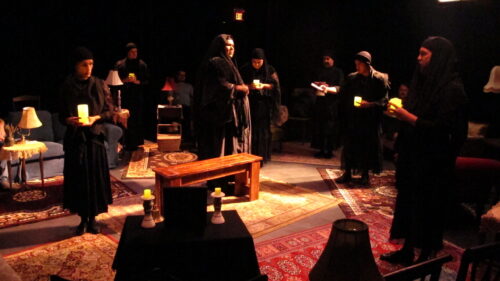Federico Garcia Lorca was a Spanish poet and playwright. He is known for his works Blood Wedding, Yerma and The House of Bernarda Alba. Lorca was openly gay and had socialist political leanings. He was assassinated on August 19, 1936. There is a bit of controversy that surrounds his murder, as it is not certain if he was assassinated for his political leanings or his sexual orientation.
In Sage Theatre’s production of Lorca’s The House of Bernarda Alba, director Javier Vilalta has adapted Lorca’s famous play to feature a cast of 2SLGBTQIA+ performers. Performed in the intimate theatre space in cSPACE King Edward, Sage Theatre’s production is poignant and visionary. All the performance elements come together to tell a riveting, dramatic story, but the replacement of female voices in the play with folks who identify as members of the 2SLGBTQIA+ doesn’t add to the narrative. The theory is that Lorca coded a series of messages to communicate with a queer audience in his play and that the female oppression in the play is representative of Lorca’s repressed desires. All the female roles were replaced with mostly male identifying artists.
The play tells of matriarch Bernarda Alba (Marshall Vielle) who, upon the death of her second husband, imposes a mourning period of 8 years on her house. None of her 5 daughters can leave the house, they must all wear black and the house feels like a prison. The youngest of the family, Adela (Ben Gaudet), defies her mother by wearing a green dress instead of a black, mournful garment. Tension rises as a suitor, Pepe el Romano (a character who is offstage the whole time), asks to marry the eldest daughter, Augustias (Conrad Belau). It turns out that Pepe has caught the eye of nearly every daughter in Bernarda Alba’s house. He is having an affair with Adela, and Martirio (Tiffany Thomas) is also in love with the young man. Amelia (Jamie Cesar) and Magdalena (Jason Hardwick) are the daughters who both stir up drama and try and keep the peace at the same time. Poncia, (Trevor Schmidt) Bernarda Alba’s servant, who is also her confidant, tries to advise Bernarda, warning her that isolating her daughters will bring misfortune. It’s a turning point when Maria Josefa, (Schmidt) Bernarda’s mother escapes her room where she is locked up and talks about how she is going to get married.
Gaudet’s Adela is defiant, vibrant and young, a contrast to the production and narrative, which features a theme of mourning and imprisonment. Schmidt displays his versatility in this role, as his talents mostly lay in comedy. It is refreshing to see his talent in drama. Vielle’s Bernarda Alba is so rigid, yet displays moments of intense vulnerability. Thomas is measured and still passionate as Martirio, and Belau’s Augustias is solid. There isn’t a weak performance in the cast.
Hanne Loosen’s stage design has comfortable furniture, sofas and love seats are the seating in the theatre, instead of folding chairs. and this really gives the production the feel of sitting in the living room of Bernarda Alba’s house. As artists pass by, the lamps on end tables turn on and off, creating a sense of poignancy within the production. Shane Anderson’s lighting design gives the production a dark edge, while having enough spotlight on the artists on stage to be able to read their expressions. Kristin Eveleigh’s sound design and Galenza-MacDonald’s costume design add to the drama of the performances.
Vilalta’s direction and vision in this adaptation is clear. But when characters talk about the only escape from the life they are living is through marriage and bearing a child, that is a very female thing. The power is removed when a mostly male identifying cast delivers lines that talk about the desire to be a man. Though the artistic vision is there and the production is well thought through, the absence of the female voices was very apparent in this production.
Sage Theatre’s production of The House of Bernarda Alba ran September 22 – October 1, but keep updated on their next production on their website.

